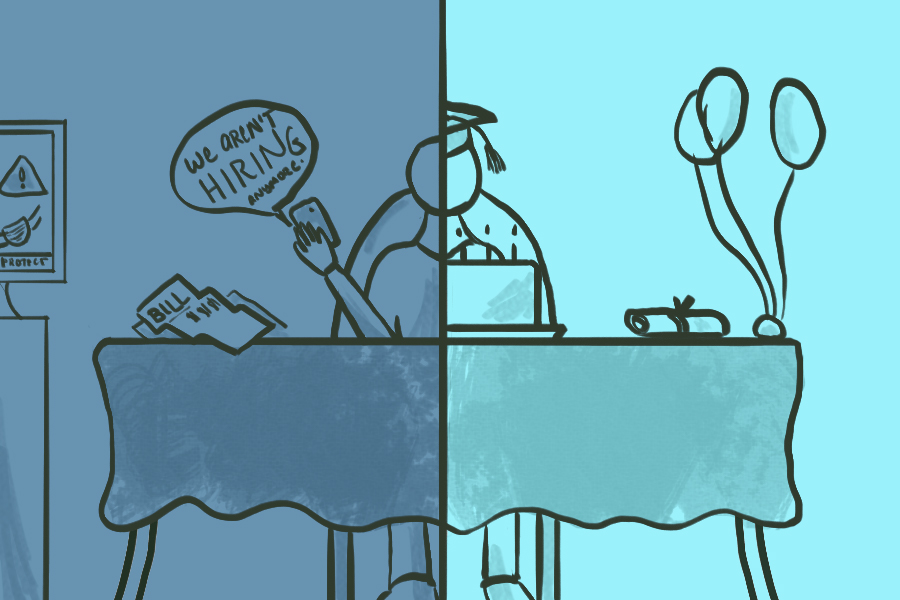First-generation college students, our triumphs are still valid
April 22, 2020

Just about four years ago from today, I committed to attending Tulane University and graduating amongst the Class of 2020. It was one of the most exciting days of my entire life. I called my dad after school, yelling and cheering about the decision, listening to him cry tears of joy over the phone and promise me any dish I wanted for tonight from our family restaurant. I printed out the commitment confirmation and placed it dead center on our dining room table. It would be the first thing that my mom would see after her shift at the daycare center.
Our entire house celebrated so much that night, eating on plates reserved for special occasions, calling and waking up family in opposite time zones, and cheering on a dream that we all had been pining towards for years. That decision would finally mean independence and agency for me, but it was all that much more significant to my parents because neither of them had the opportunity to attend college themselves.
Every argument, dinner dialogue and phone call in my family somehow always found its way back to college. Each night when I would come back from working with my dad at our restaurant, angry and tired from the long shift, he would remind me that it was all for me and my brother, that these struggles today would result in a college education tomorrow. I would study and learn relentlessly in school, motivated by the dreams of my parents resting on my shoulders.
Sometimes I would daydream about what it would all look like, achieving the dream of college graduation. I could picture my parents running towards me after commencement, tears in eyes and flowers in hand, proud that all of their sacrifices coalesced to that paper degree I would be bouncing up in the air.
I would dream about what my life would look like after college, living in some backdoor shitty New York apartment, running late to work the next morning with an iced coffee spilling over my hand. The days at the office would be long and I would question my values every hour I was there, but it would still be worth it to be able to give my parents the life of luxury they deserved.
I would dream of the day I would never have to wait on another table. I could finally toss out my black waiter apron and invite my family to be the guests at a fancy restaurant they had been eyeing for months. We would sit around and laugh about how much studying my brother and I did in high school, maybe plan a vacation to visit family back in Bangladesh.
In my senior year of college, many of these dreams were just beginning to transition into reality. In mid-March, I really thought that I had at least some fragment of my life planned out. I was almost suspicious of how well things seemed to be going. And then as if almost perfectly timed, ah yes, a global pandemic.
The entire world around me transformed hour by hour, minute by minute. Suddenly, I had no plans for the future, let alone any plans for tomorrow. My high school daydreams seemed to become just what they were to begin with: daydreams.
As everything unfolded around me, I suddenly began to question everything that I had done in college. If I had pursued another major, would I have had more job security? If I had stayed closer to home for school, could I be more helpful to my family right now? Questions about things that could not have been changed began to make me feel anxious and doubtful.
The coronavirus pandemic has hit communities in different ways, all incredibly hurtful. Among those heavily impacted are first-generation and low-income college students.
As colleges announced campus closures, many students did not have homes they could come back to or the capability to return to college if they did. For some full-time students at college, coming back home early from a semester did not necessarily mean they could continue that same academic commitment.
With dwindling family resources, first-generation and low-income students are now expected to care for aging grandparents, teach younger siblings their courses and run all errands because they’re the healthiest person in their home. Additionally, many college students have been left out by the government’s stimulus efforts because they are still claimed as dependents.
As students are grasping for part-time jobs to supplement their family’s income and being forced into much of the same routines they had to practice in high school, it can feel like our college successes are slipping away from us. And again, we are back into the unforgiving systems that double burden us.
My heart hurts so much for this community. The students who were studying abroad, many of whom were the first from their family to ever do so, had to cut their semesters short and return home. An internship the summer before senior year can be critical for students deciding between varying career paths, and now, cancelled internships are a norm for students all across the country.
I know that these experiences are not unique to first-generation and low-income students, but the steps these students have to take to achieve these things is doubly increased. The countless hours spent applying to scholarships, cold-messaging people on LinkedIn, and doubting whether this goal was even attainable now live in the margins of an unexpected reality, another disparaging struggle all too common for marginalized students.
From the very moment we arrived on campus, we knew that we would be faced with challenges the vast majority of our peers would never have to experience. Yet, there was no way for us to know that our futures might have had to be this much harder.
I know that when all of these triumphs that were hours and days and months in the making are disappearing, it is easy to feel like we are failing. And I get that feeling, it is immensely frustrating, getting so so close to your goals and watching them wither away to things that you can’t control.
I want to talk about how tired I am of that feeling, tired of having odds stacked against you and tired of being told to stop “complaining” when you talk about it. I wish I had some words of wisdom or hope to somehow get all of us through this, but I think I am tired of looking for that too.
While the future remains agitatedly uncertain, I think what is most important for me – in this moment – is reminding ourselves that our successes are still successes. We got that prestigious scholarship, internship or post-grad offer, and we did defy expectations. Graduation may not come as we thought it would, but we will still be doing the damn thing.
There are two great things about being a part of this community that come to mind right now. First is that adversity has made us who we are. We are no strangers to it. I know that we are capable of overcoming this obstacle because overcoming obstacles is what we know best. It is deeply a part of what has granted us the successes that we have.
Secondly, the first-generation and low-income community is at its core a community. It is okay for us to lean on each other. There are professionals at our school and in our fields who are rooting for us and who see us. They are polishing off the special occasion silverware, ready to help us get where we need to be.
Four years ago, I had absolutely zero idea of what my college experience would be. Four years later, I am still pretty uncertain about the future, but I know that the triumphs that I have fought to have with me today are not dependent on the things that I might not achieve tomorrow.























Cc • Feb 6, 2021 at 5:02 pm
Do you feel that your decision and parents sacrifice were worth it after your four years at Tulane? Would you recommend your experience at Tulane to an incoming 1st generation student?
b • Apr 27, 2020 at 12:41 pm
Really beautifully said!
Mrs T • Apr 25, 2020 at 5:05 pm
As a parent of a 1st Gen Tulane Senior, thank you for this.